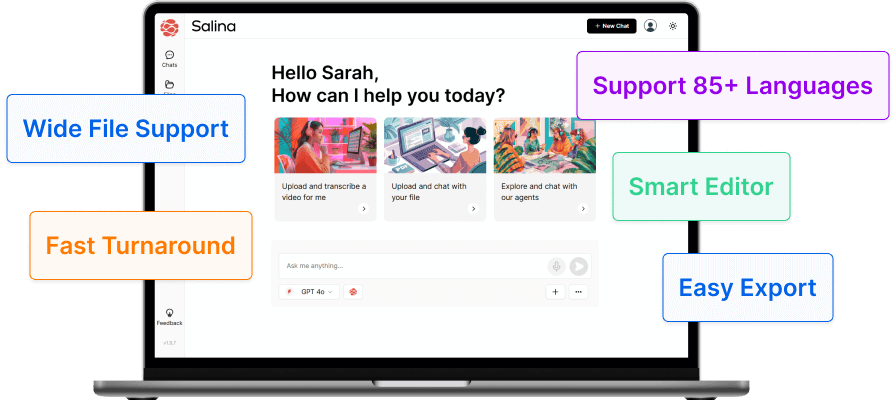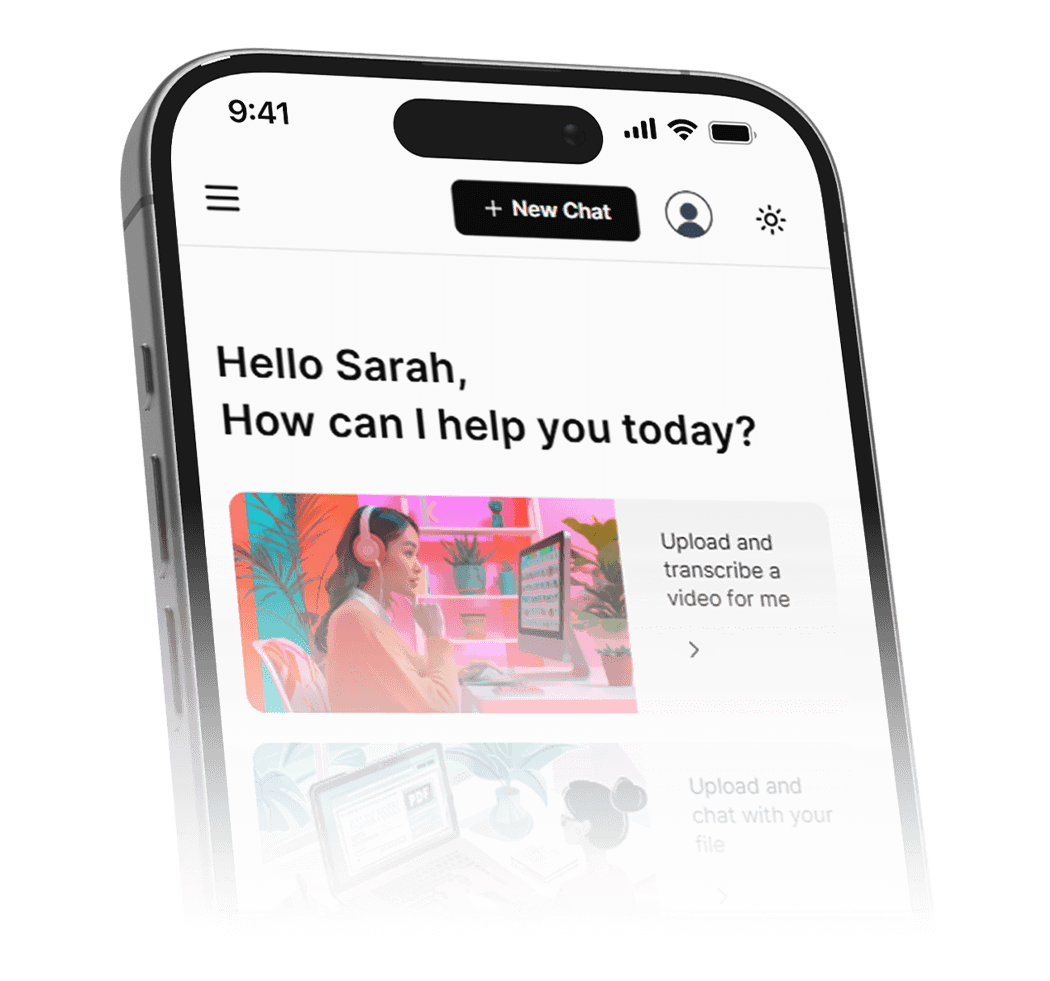Is your podcast getting lost among thousands of others? The titles of your episodes might be actively pushing listeners away before they even hit play.
You put your heart into creating amazing podcast episodes, but the harsh truth is this: Even the best content can’t save you if your titles are driving potential listeners away. The good news? This is one of the easiest problems to fix. Let’s explore the proven strategies that will transform your titles from audience-killers into listener-magnets.
Why Great Podcast Titles Matter
Your title is often the first thing potential listeners see. It’s your chance to make them interested enough to check out your episode. Think of your title as your podcast’s handshake with new listeners – it needs to be strong and memorable. A well-crafted title serves as the bridge between your content and potential listeners, creating that important first impression that could determine whether someone decides to tune in.
An effective podcast title should capture attention immediately while clearly communicating what the episode offers. It needs to spark curiosity or promise clear value, all while being easily discoverable through search. Most importantly, it should reflect your podcast’s unique voice and brand identity, setting the tone for what listeners can expect.
As advertising expert David Ogilvy once said,
“Five times as many people read the headline as read the body copy.”
This principle rings especially true for podcast titles – they’re your first and sometimes only chance to pull people in. When you write your title, you’re investing most of your creative energy upfront, because that title needs to do the heavy lifting of getting people interested enough to press play.
6 Proven Ways to Write Better Podcast Titles
1. Make People Curious
Curiosity is indeed a powerful tool for crafting compelling podcast titles. One famous podcaster who expertly implements this strategy is Ira Glass, host of the popular podcast “This American Life.”
Looking at This American Life’s episode titles and visuals demonstrates the masterful implementation of curiosity-driven storytelling. Each title creates an information gap that compels listeners to discover more, while the accompanying images add emotional depth without revealing the full story. From “The Official Unofficial Record” with its powerful crowd imagery depicting Venezuelan voters creating their own election records, to the intimate personal narrative suggested by “If You Want to Destroy My Sweater, Hold This Thread as I Walk Away,” each title hints at a larger story while withholding key details. Take a look at some of This American Life’s title cards that showcase their storytelling approach on apple podcasts below.
Ira Glass and his team are masters at creating titles that pique curiosity without giving away too much. They often use unexpected angles or intriguing phrases that make listeners want to know more. For example, episodes below like “The Truly Incredible Story of Keiko the Killer Whale” or “This Is the Cake We Baked” create a curiosity gap that entices listeners to tune in and discover the full story.
Glass’s approach to titling exemplifies the art of revealing just enough to spark interest while withholding the key details that make the story compelling. This technique not only draws in new listeners but also keeps regular audiences eagerly anticipating each new episode, wondering what surprising narrative or unique perspective they’ll encounter next.
By following Glass’s example, podcasters can craft titles that create a sense of intrigue and prompt potential listeners to hit play, eager to satisfy their curiosity and close the information gap presented by the title.
2. Show Clear Benefits
People are constantly looking for ways to improve their lives or solve pressing problems. Your title should clearly communicate how your episode will help them do exactly that. This approach stems from a fundamental principle of human psychology – we’re more likely to invest our time in something when we can clearly see what we’ll gain from it.
When highlighting benefits in your titles, consider both the immediate and long-term value your episode offers. Think about the practical skills listeners will learn, the insights they’ll gain, or the problems they’ll be able to solve. The key is to be specific about the value you’re offering. Vague promises are less compelling than concrete, actionable benefits that listeners can envision applying to their own lives or work.
In my search to understand podcast discoverability better, I came across an insightful Reddit thread where creators were openly sharing their success strategies. It was fascinating to see how many relied on a strategic mix of social media presence, guest appearances on other shows, and creating high-quality, shareable content to attract listeners. This discovery reinforced something important – your title needs to reflect the unique value your episode offers to stand out in an increasingly crowded field.
3. Use Numbers
Numbers in titles work because they provide structure and set clear expectations for your content. They signal to potential listeners that your content is organized and digestible, making it feel more approachable and manageable. Numbers also stand out visually when people are scrolling through podcast listings, helping your episode catch attention.
The psychology behind using numbers goes deeper than simple organization. Specific numbers feel more credible and researched than general claims. They suggest expertise and thoroughness, implying that you’ve done the work of collecting and organizing valuable information for your listeners. This can be particularly effective when combined with strong benefits or curiosity-driving elements.
When I first started researching podcast titling strategies, I spent hours reading through podcasting forums. One discussion particularly caught my attention – podcasters were sharing their real-world experiences with number-based titles. I learned that many create multiple versions of their titles, testing ones with and without numbers to see what resonates with their audience. What fascinated me most was discovering that odd numbers like 5 or 7 tend to perform better, creating more intrigue than even numbers.
Consider how numbers can enhance your title’s appeal. For example, “5 Surprising Facts About Sleep” not only promises organized content but also hints at unexpected information, combining the power of numbers with curiosity-driving elements.
4. Choose Strong Words
The power of language in podcast titles cannot be overstated. Certain words naturally grab attention and evoke emotional responses, making your titles more compelling and clickable. These power words can create urgency, exclusivity, or excitement, but they must be used thoughtfully and honestly.
The key to using strong words effectively is to ensure they align with your content’s actual value. Your word choice should reflect the genuine benefits and insights your episode offers, rather than simply trying to generate clicks. This builds trust with your audience and helps establish your podcast’s credibility over time.
Holly Cope, a digital nomad and podcasting expert, emphasizes the importance of using “power words” in podcast titles. In a LinkedIn post, she advises:
“Make your titles stand out with power words that spark curiosity. Use words like ‘secret,’ ‘exclusive,’ ‘revolutionary,’ or ‘game-changing’ to create intrigue and compel listeners to click.”
However, Cope also cautions against overusing these words, stating, “Balance is key. Use power words sparingly and ensure they accurately reflect your content to maintain credibility.”
By following this advice, you can create titles that are not only attention-grabbing but also truthful representations of your podcast content, helping to build a loyal and engaged audience over time.
5. Ask Questions
Questions in titles are effective because they engage listeners’ minds directly and tap into their natural curiosity. A well-crafted question can make potential listeners stop scrolling and start thinking about their own experiences or challenges related to your topic. This personal connection can be a powerful motivator for them to tune in.
When using questions in your titles, focus on those that resonate with your target audience’s real concerns and interests. The best questions are specific enough to be meaningful but broad enough to appeal to a significant portion of your potential listeners. They should promise answers to problems or curiosities that your audience actually cares about.
A notable example of a podcaster who effectively uses questions in episode titles is Minnie Driver in her podcast “Minnie Questions with Minnie Driver.“
Listen to her conversations where she explores life’s meaningful questions with guests on Spotify:
As the title suggests, Driver’s entire show concept revolves around asking thought-provoking questions to her guests. Her episode titles often feature intriguing questions that pique listeners’ curiosity and hint at the content of the conversation. This approach not only engages potential listeners but also sets clear expectations for the episode’s content, making it more likely for interested audiences to tune in.
6. Connect with Current Topics
Linking your content to current events and trending topics can significantly increase its relevance and discoverability. This strategy works because it connects your expertise and content with conversations that are already happening, making your podcast feel timely and essential.
However, the key to successfully using trends is finding the right balance between timeliness and lasting value. While trending topics can attract immediate attention, your content should offer insights that remain valuable beyond the current moment. This approach helps build sustainable audience growth while maintaining your podcast’s long-term relevance.
Recent trends in podcasting emphasize the importance of staying relevant and timely with content. According to Acast’s 2024 Podcast Pulse report, podcast audiences are increasingly discovering new shows through social media platforms.
Specifically, 58% of podcast listeners reported discovering new podcasts on YouTube in 2024, up from 52% in 2023. Additionally, 31% found new podcasts on Reddit in 2024, compared to 25% the previous year.
To effectively connect your podcast with current topics:
- Use platforms like YouTube and Reddit for promotion, as they’re growing in importance for podcast discovery.
- Create content that aligns with ongoing discussions in your niche, making your podcast feel timely and essential.
- Balance trending topics with evergreen content to ensure long-term relevance and sustainable audience growth.
- Use social media to share clips or highlights that connect your podcast episodes to current events, increasing shareability and engagement.
By staying attuned to these recent trends and adapting your content strategy accordingly, you can enhance your podcast’s relevance and attract more listeners in the dynamic and constantly changing podcast space. Remember, the goal is to create content that feels relevant now but continues to provide value to listeners who discover it later.
For more insights into how listeners find and engage with podcasts, download the complete Acast 2024 Podcast Pulse report by clicking the image below.
Best Practices for Every Title You Write
The art of writing effective podcast titles requires attention to several key principles. First, keep your titles concise – aim for under 60 characters to ensure they don’t get cut off on various platforms. Put your most important and attention-grabbing words at the beginning, where they’re most likely to catch someone’s eye.
Consider search optimization as you write. Include relevant keywords that your potential listeners might use when looking for content like yours. However, don’t sacrifice clarity or natural language for the sake of keywords – your titles should read smoothly and make immediate sense to your audience.
Regarding episode numbers, opinions among podcasters vary. Some argue that numbers help listeners track episodes, especially for shows with a linear narrative. Others prefer to focus on content-driven titles for better SEO. In a Reddit discussion about episode titling, one podcaster who focuses on musical artists and their albums shared their approach: “Tom Petty ‘Wildflowers’ – #54”. This format effectively balances artist information, content, and episode number, providing clarity for both new and returning listeners while maintaining searchability.
When it comes to structuring your episode titles, there’s no one-size-fits-all approach. A Reddit discussion on proper episode titling revealed diverse strategies among podcasters. Some prefer putting the episode number first, followed by the guest’s name and a brief description. Others advocate for leading with the topic or a compelling question, with the guest’s name at the end. The key is to prioritize what matters most to your audience and to use the limited character space effectively to hook potential listeners.
It’s important to note that while episode titles aren’t subject to copyright law, they could potentially infringe on trademarks. For instance, using a title like “An Empire Strikes Back” might attract unwanted attention from Disney. Additionally, such titles can harm your SEO by making your content harder to find among search results for the original work.
The inclusion of your podcast topic in the title is another point of debate among podcasters. A recent Reddit discussion highlighted various perspectives.
Some podcasters argue that including the topic in the name helps with discoverability and immediately informs potential listeners about the content. Others prefer more creative or intriguing titles that pique curiosity, believing that the podcast description can provide topic details.Many suggest a balanced approach: including a keyword or topic hint in the title while still leaving room for creativity.
Consider your specific podcast and audience when deciding whether to include your topic in the title. Test different approaches and monitor which titles perform best with your listeners.
Consistency in your titling approach helps build recognition and trust with your audience. While each title should be unique, maintain a consistent style or format across your episodes. This helps listeners know what to expect and builds your podcast’s brand identity over time.
Key Takeaways
- Craft concise, attention-grabbing titles that clearly communicate value to listeners
- Use curiosity, benefits, and strong language to make titles stand out
- Incorporate numbers, questions, or current topics to increase engagement
- Optimize titles for search while maintaining natural language and clarity
- Maintain consistency in titling approach to build brand recognition over time
What’s Next?
Now that you’ve learned the art of crafting compelling podcast titles, it’s time to put these strategies into action. Start by reviewing your existing episode titles and see where you can apply these techniques to make them more engaging and searchable.
For your upcoming episodes, try creating multiple title options using different strategies, and test which ones perform best with your audience. Pay attention to your download numbers and listener feedback to refine your approach over time.
Remember, creating great podcast titles is an ongoing process. Stay informed about trends in your niche, keep experimenting with different title formats, and always prioritize your audience’s interests and needs. With practice and persistence, you’ll develop a knack for creating titles that not only attract more listeners but also accurately represent your valuable content.
As David Ogilvy wisely noted, “Never stop testing, and your advertising will never stop improving.” The same principle applies to your podcast titles – continuous experimentation and refinement will help you develop an increasingly effective approach to attracting and engaging listeners.
Save Time on Podcast Titles with Salina
Even with the best strategies, coming up with the perfect podcast title can be challenging. These days, AI tools can save you time and spark creativity by generating title ideas automatically.
Salina’s Podcast Title Generator, for example, can quickly provide you with a range of catchy and SEO-friendly title options based on your podcast’s topic and target audience. It’s a free feature that allows you to easily refine results or request different tones of voice, such as professional, creative, or conversational.
Let Salina handle the brainstorming, so you can focus on creating amazing podcast content.
Podcast Title Generator FAQ’s
What is a Podcast Title Generator?
A Podcast Title Generator is an AI-powered tool designed to help podcasters create engaging and effective titles for their episodes. It uses algorithms to generate title suggestions based on input keywords, themes, or descriptions related to the podcast content.
How does a Podcast Title Generator work?
Users typically input information about their podcast episode, such as the main topic, keywords, or a brief description. The generator then processes this information and produces a list of potential titles using AI algorithms. These titles aim to be catchy, relevant, and optimized for search.
Are the titles generated by AI unique?
While AI-generated titles can be creative and diverse, it’s important to review and potentially customize them to ensure they perfectly fit your podcast’s style and content. Always check for uniqueness and avoid any potential copyright issues.
Can a Podcast Title Generator improve my podcast’s discoverability?
Many Podcast Title Generators are designed with SEO in mind, incorporating relevant keywords that can potentially improve your podcast’s visibility in search results. However, the effectiveness can vary, and it’s best to combine AI suggestions with your own knowledge of your audience and content.
Is it better to use a Podcast Title Generator or create titles manually?
A Podcast Title Generator can be a valuable tool for inspiration and efficiency, especially when you’re dealing with multiple episodes. However, it’s often best to use it as a starting point and then refine the suggestions based on your unique understanding of your podcast and audience. Combining AI assistance with human creativity often yields the best results.
Salina is a podcast transcription and translation tool that specializes in making your stories accessible to global audiences. We transform hours of manual work into minutes, preserving your unique voice and cultural nuances across 85+ languages while enhancing your content’s discoverability on major podcast platforms. Start reaching new audiences with your stories today.




